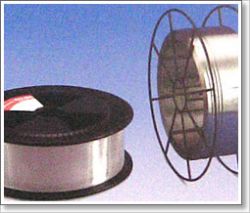Mig Welding Wire
| Price : | Price Negotiable |
| Quantity : | 12 () |
| Minimum Order : | 12 |
| Product Status : | New |
| Sample Available : | yes |
| Payment Mode : |
Escrow |
| Categories : | Light Industry & Daily Use, Carpet |
| Posted By : | Tigsure Welding Wire Factory |
Description
Mig welding wire can be aluminum welding wire, stainless steel welding wire or other alloy wire specially for mig welding processes.
Solid wire MIG welding:
Metal inert gas (MIG) welding was first patented in the USA in 1949 for welding aluminium. The arc and weld pool formed using a bare wire electrode was protected by helium gas, readily available at that time. From about 1952 the process became popular in the UK for welding aluminium using argon as the shielding gas, and for carbon steels using CO 2 . CO 2 and argon-CO 2 mixtures are known as metal active gas (MAG) processes. MIG is an attractive alternative to MMA, offering high deposition rates and high productivity.
Process characteristics
MIG is similar to MMA in that heat for welding is produced by forming an arc between a metal electrode and the workpiece; the electrode melts to form the weld bead. The main differences are that the metal electrode is a small diameter wire fed from a spool and an externally supplied shielding gas is necessary. As the wire is continuously fed, the process is often referred to as semi-automatic welding.
Shielding gas
In addition to general shielding of the arc and the weld pool, the shielding gas performs a number of important functions:
forms the arc plasma
stabilises the arc roots on the material surface
ensures smooth transfer of molten droplets from the wire to the weld pool
Thus, the shielding gas will have a substantial effect on the stability of the arc and metal transfer and the behaviour of the weld pool, in particular, its penetration. General purpose shielding gases for MIG welding are mixtures of argon, oxygen and CO 2 , and special gas mixtures may contain helium. The gases which are normally used for the various materials are:
steels
CO 2
argon +2 to 5% oxygen
argon +5 to 25% CO 2
non-ferrous
argon
argon / helium
Argon based gases, compared with CO 2 , are generally more tolerant to parameter settings and generate lower spatter levels with the dip transfer mode. However, there is a greater risk of lack of fusion defects because these gases are colder. As CO 2 cannot be used in the open arc (pulsed or spray transfer) modes due to high back-plasma forces, argon based gases containing oxygen or CO 2 are normally employed.
Applications
MIG is widely used in most industry sectors and accounts for more than 50% of all weld metal deposited. Compared to MMA, MIG has the advantage in terms of flexibility, deposition rates and suitability for mechanisation. However, it should be noted that while MIG is ideal for 'squirting' metal, a high degree of manipulative skill is demanded of the welder.
 |  |
|---|
 |
|
